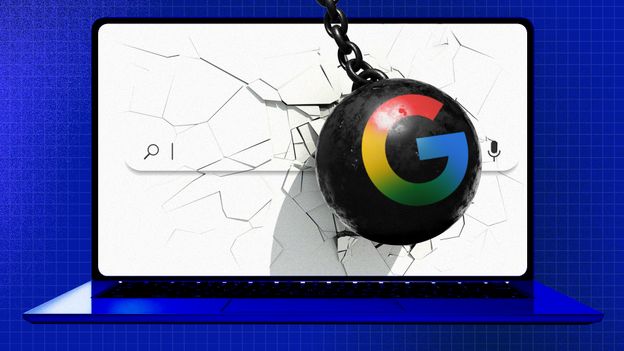- cross-posted to:
- technology@lemmy.world
- technology@beehaw.org
- cross-posted to:
- technology@lemmy.world
- technology@beehaw.org
Google says a new AI tool on its search engine will rejuvenate the internet. Others predict an apocalypse for websites. One thing is clear: the current chapter of online history is careening towards its end. Welcome to the “machine web”.
The web is built on a simple bargain – websites let search engines like Google slurp up their content, free of charge, and Google Search sends people to websites in exchange, where they buy things and look at adverts. That’s how most sites make money.
An estimated 68% of internet activity starts on search engines and about 90% of searches happen on Google. If the internet is a garden, Google is the Sun that lets the flowers grow.
This arrangement held strong for decades, but a seemingly minor change has some convinced that the system is crumbling. You’ll soon see a new AI tool on Google Search. You may find it very useful. But if critics’ predictions come true, it will also have seismic consequences for the internet. They paint a picture where quality information could grow scarcer online and large numbers of people might lose their jobs. Optimists say instead this could improve the web’s business model and expand opportunities to find great content. But, for better or worse, your digital experiences may never be the same again.
On 20 May 2025, Google’s chief executive Sundar Pichai walked on stage at the company’s annual developer conference. It’s been a year since the launch of AI Overviews, the AI-generated responses you’ve probably seen at the top of Google Search results. Now, Pichai said, Google is going further. “For those who want an end-to-end AI Search experience, we are introducing an all-new AI Mode,” he said. “It’s a total reimagining of Search.”
You might be sceptical after years of AI hype, but this, for once, is the real deal.



It might be harder than you think…
What kind of information are you talking about? Let’s be specific. The phone number for a garden center or how a rocket engine works? This won’t affect every search the same way. This is actually a fantastically complex question and we’ll only really see what happens when it does.
It’s really not. You seem to be insinuating they’ll take a nuanced approach and treat different types of websites differently, but there is no reason to believe that is the case, and it’s not what they’ve been doing thus far. Espousing that Google has a sustainable long term plan for the internet that we’re too stupid to understand just makes you look ridiculous tbh
You’ve misunderstood me (let’s just say “not deliberately” for a moment). What I’m saying is that regardless of what Google does in terms of long term plans or nuanced anything not all searches are equal. Neither you nor I can say at this point how this will shake out. Also, what have you eaten today? You know what you’re like when you don’t eat…
I understood you perfectly, made clear by the fact you’re doing it again. You’re trying to deflect from the obvious mechanics of this endeavor (let’s just say “not deliberately” for a moment) by saying it’s too nuanced and complicated for our tiny pea brains to understand even though it’s completely obvious when you use your brain for 5 seconds.
I give up, you win.